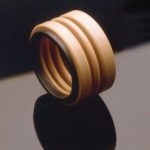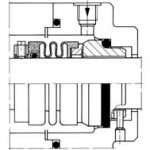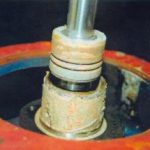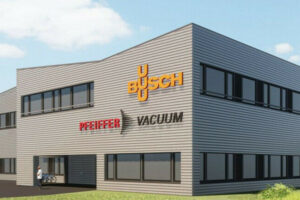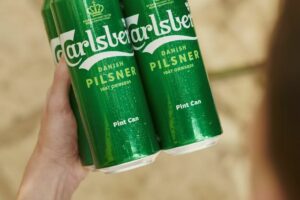The MTBF is not the only important variable to be taken into consideration these days for pump seals: other costs such as installation times and plant downtimes are also relevant. The KMB mechanical seal concept potentially offers major improvements in service life, and hence cost savings, for many applications.
Dieter Ziegenbein
Mechanical seals are today widely employed in lacquering lines in the pumps used to convey media. The diverse lacquering techniques necessitate often highly complex systems, with the seals having to meet widely varying requirements. Depending on the system component in question, they may have to cope with incrustations from sedimentation, aggressive chemicals or even abrasion. Additional requirements arise out of the need for regular flushing of the pipe system with powerful acids and alkalis. In this connection, single and double O-ring mechanical seals, bellows seals and cartridge seals, permanently installed, offer a service-proven solution.
Modern lacquering systems can be classified in three main processes according to the requirements imposed on durability and service life: electrophoretic enamelling, ana-phoresis and cataphoresis. Where stringent corrosion requirements are specified because of strong resistance, cataphoresis is the current standard. These complex systems involve outlay-intensive preliminary immersion treatment in the form of so-called zinc-phosphatizing. Zinc-phosphatizing makes considerable demands on mechanical seals, frequently causing massive caking on all surfaces after just a short period of use and blocking the axial movement of the seal in consequence. In other respects the operating conditions in this part of the plant, characterized by approx. 1 bar of pressure and an operating temperature of approx. 55 °C, are not particularly dramatic.
Every O-ring seal previously used – including the service-proven rubber bellows seal – proved to be less than satisfactory in terms of service life.
Non-metal Peek seal
It was with the objective of achieving a much longer service life that the KMB mechanical seal concept was introduced. This seal was developed by Burgmann as a synthetic bellows seal for highly aggressive media in the chemical and petrochemical industries. As a non-metal, single seal it is suitable for pumps made of synthetic or ceramic materials and for high-quality metal pumps built with titanium or hastelloy. Thanks to its external pressurization and inboard design, it offers major advantages over outboard versions, for example less leakage and improved stress-handling capacity.
The extensive use of these non-metal Peek seals in the aforementioned phosphatizing plant has resulted in a much longer service life – meanwhile between 1 and 1 ½ years. Also of note here is that the increased service life not only reduces spare parts requirements but also results in large savings in terms of the follow-up costs associated, for instance, with pump disassembly. Even after longer periods in service, only small amounts of deposits were found, primarily because of the particularly anti-adhesive properties of the Peek surface and the open, self-cleaning geometry of the bellows.
In the past, commercially available internal mechanical seal concepts for highly aggressive media have taken the form of combinations of metal components with, and serving as base material for, seal faces and seats that are usually made of ceramic. Combinations consisting of a bellows body made of highly chemical-resistant PTFE, which is fastened to the pump by metal clamping rings, are also available on the market. These seal concepts are outboard concepts, i.e. they are located outside the lid of the pump. The major disadvantage of this arrangement is that the seal is exposed to internal pressurization, i.e. the medium presses against the seal on the inside, generally resulting in much higher product leakage rates compared to externally pres-surized seals. Moreover, the limits of pres-sure application are also lower. The KMB seal eliminates these disadvantages. With zero metal content, the crucial feature of this seal is the roller bellows made of Peek material, which is extremely resistant to acids and alkalis. A further advantage is offered by the first ever threaded pins made of ceramic material for fastening to the pump shaft/shaft sleeve. The seal is rounded off by a seal face which is shrink-fitted directly into the Peek bellows, plus a torsion-locked seat made of service-proven materials. For the secondary sealing elements, O-rings made of PTFE and other well-known elastomers are used.
Advantages of the KMB concept
What important advantages does this seal system offer for similar plants and for the chemical industry in general?
Firstly, there is the general argument in favour of bellows seals which do not involve any moving O-rings, since these can damage the shaft. Other benefits lie in the higher limits of pressure application and the considerable reduction in leakage compared to outboard, partly non-metal sealing concepts. The self-cleaning design, suitable for sterile applications, the much lower level of deposits compared to roller bellows seals made of Hastelloy and hence the reduced sensitivity to pressure surges, are further particularly notable features of this concept.
Since it facilitates single-acting sealing while at the same time using environment friendly media, the concept also offers potential for further cost savings. Normally, a double-acting system (back-to-back) is required to achieve a non-metal solution on the product side.
In the meantime this sealing concept has gone on to provide valuable service not just in diverse lacquering lines but in other applications as well, for instance in refuse incineration plants. Owing to the aggressive mixtures of media involved, the requirements of these applications are likewise demanding.
cpp 404
Share:



